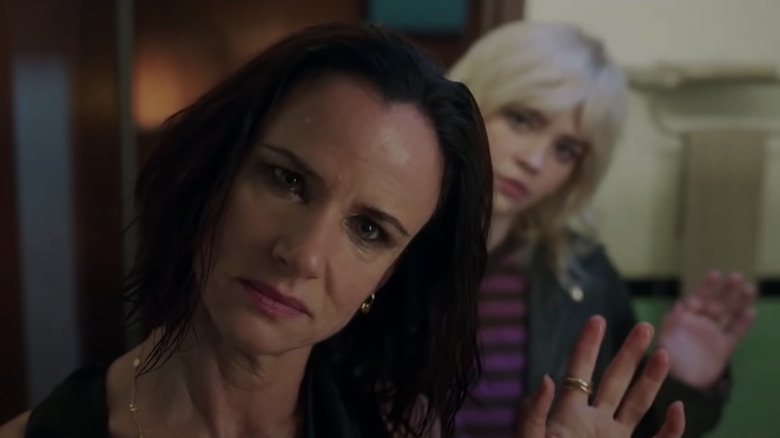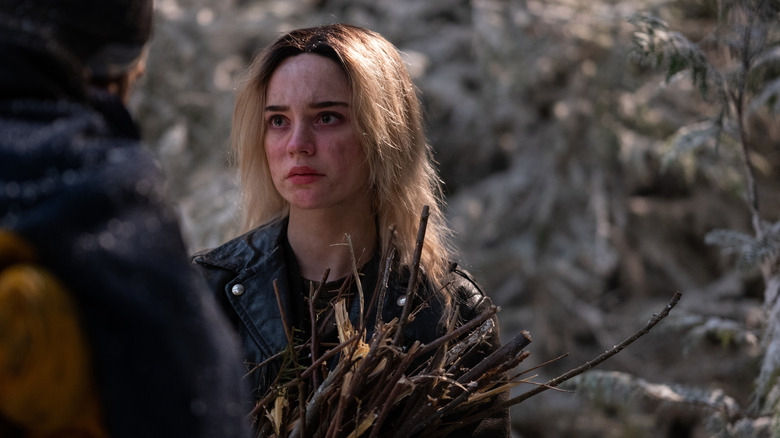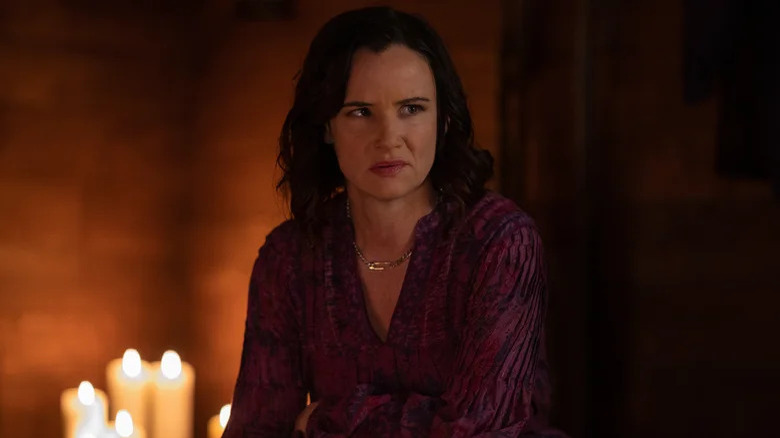
Spoilers for "Yellowjackets" follow.
My favorite "Yellowjackets" character is Natalie Scatorccio (Sophie Thatcher/Juliette Lewis), the most grounded, no-BS of the 1996 plane crash survivors and seemingly the group's conscience. I've written before that she is the series' heart and soul, but after the season 2 finale — "Storytelling" — I realized that I hadn't considered if Natalie herself would agree with that description.
In "Storytelling," Natalie says in both past and present that she doesn't see herself as a good person. We already knew that she accidentally caused her abusive father to shoot himself when she was younger. Season 2, episode 8 —"It Chooses" — reveals that she let Javi (Luciano Leroux) drown to save herself from ritual sacrifice, exacerbating her survivor's guilt.
Most "Yellowjackets" fans, myself included, thought this would be the last straw for Nat. Some theorized that the survivors were ultimately rescued because she left them in disgust, made it back to civilization, and brought help. In a way, it was Nat's last straw — but in the opposite direction of what we expected. Rather than pushing her away from the madness, Javi's death made her embrace it.
Season 2 upended our expectations around Lottie (Courtney Eaton/Simone Kessell) throughout its run. The finale unveils how the season has been doing the same for Natalie. Lottie bestows leadership of the group onto Natalie, and the latter accepts it, even cracking some smiles as the others bow before her. She rejects Ben's (Steven Krueger) offer to leave, and he writes her off as too far gone — just like the rest.
If you think you're a bad person, it's easier to do bad things or passively let them happen. It now seems clear that Natalie let her self-loathing push her down into darkness alongside the others.
Why Did We Think Natalie Was Going To Be Different?

In the present, Natalie has the strongest moral compass. On the surface, she's the meanest Yellowjacket, but she also doesn't have a cruel streak like Shauna (Melanie Lynskey) and Misty (Christina Ricci) do. She spends most of her time investigating the death of her old flame Travis (Andrès Soto), not butchering small animals, abducting people, or leading a pseudo-cult.
In the past, she's also been the voice of reason. In "Doomcoming," she's the only girl who doesn't devolve into savagery. She's also been consistently skeptical of Lottie's burgeoning religion and "visions" from the Wilderness. I think this is key; we'd been convinced Lottie would be the villain, so Natalie standing against Lottie's delusions made her seem more heroic. Season 2, episode 4 — "Old Wounds" — when Lottie fails to find food and Natalie has to lead the others on a (failed) effort to recover a dead moose, initially seemed like just another example of Natalie staying down to earth. Now, though, it foreshadows the power dynamic flip in "Storytelling."
Indeed, there are even more breadcrumbs on this trail. In season 2, episode 5, "Two Truths and a Lie," Natalie experiences a vision during meditation with Lottie and sees herself wearing the Antler Queen veil. Was she the horned cannibal leader in the Pilot, not Lottie? Taissa (Tawny Cypress) saying back in season 1 that "we wouldn't be here if it weren't for Nat" rings a lot darker now.
Surviving Survivor's Guilt

In the present, Natalie's arc is about healing and self-forgiveness. That wouldn't make much sense if she was the only one who retained her moral code in the wilderness. We now know she considers herself the worst of them all and why she does. This is also why pairing her with Lottie this season made sense. At Camp Green Pine, Natalie is surrounded by other hurt people who are seeking healing. Her pairing with Lisa (Nicole Maines) this season is about Natalie and an avatar of her younger self trying to help each other.
Now we get to the most controversial part of "Storytelling" — Natalie's death, which has been met with backlash and left some skeptical about season 3. I don't hate it conceptually. Natalie's burden has been her survivor's guilt, so her refusing to let Lisa die in her place makes sense as the culmination of her journey (the show includes a flashback montage just beforehand to hammer this in). I do find sacrifice as redemption an old-hat trope, but with the prior context of Natalie's character, it makes sense here.
What I do question is the wisdom of killing off Natalie so early. We've reached a turning point with her character in the 1996 timeline, so now is an odd time to write her out of the 2021 story. I would've preferred to watch these parallel arcs play out over more seasons, with past Natalie descending deeper and her present self trying to pull herself out of that pit.
We know how Natalie's journey ends, but there are still chapters to fill in. Even though she's not gone completely, "Yellowjackets" still goes into season 3 without its heart.
"Yellowjackets" is streaming on Paramount+ and Showtime.
Read this next: Shows To Watch If You Miss Yellowjackets
The post Have We Been Misjudging Natalie On Yellowjackets? appeared first on /Film.
